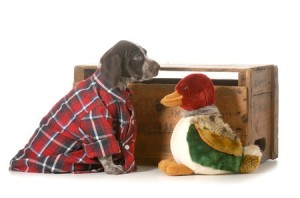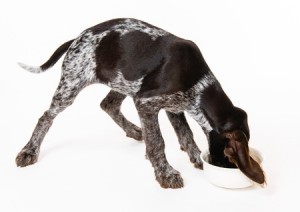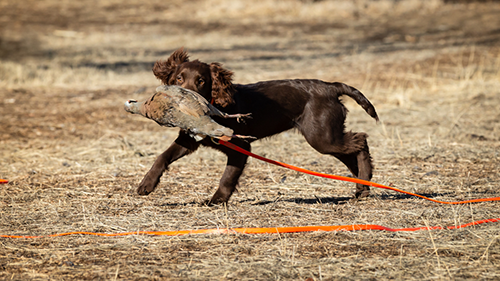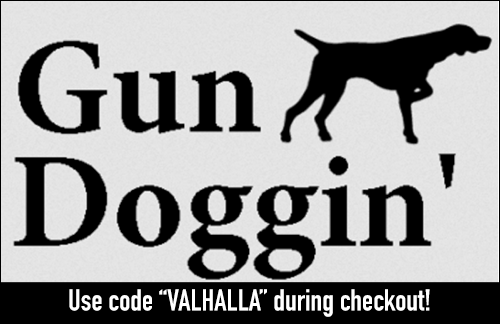Blog
 While choosing the right puppy to be your gun dog is obviously important to their success, you’ll still need to develop your puppy into a healthy, well-tempered adult dog. Before tackling more complicated training, you’ll need to make sure your puppy is comfortable interacting with other people and situations.
While choosing the right puppy to be your gun dog is obviously important to their success, you’ll still need to develop your puppy into a healthy, well-tempered adult dog. Before tackling more complicated training, you’ll need to make sure your puppy is comfortable interacting with other people and situations.
You should get serious about socialization when your dog begins to establish its independence and has reached a sufficient level of mental development. For most dogs, an ideal window is at an age of around six to eight weeks, but every breed—and every individual puppy, for that matter—is different.
Every dog, however, should be introduced to new people and environments at an early age. This is especially true for potentially uncomfortable interactions, like with the veterinarian, obedience teacher, kennel, and groomer. Whether you’re with family, friends, or complete strangers, encourage other humans to gently handle your puppy to get him used to interaction and build confidence. Socializing with other dogs is just as important as human interaction. Dog parks are a great place to meet other puppies and build confidence in being around them.
Interacting with others is very important, but you’ll want your puppy to show unmatched companionship and loyalty to you, so take him with you wherever you can, personally introducing him to new experiences that strengthen your relationship. Play with him, displaying a positive attitude, and use his name over and over. It’s okay to let him wander a bit, but always keep a watching eye and be ready to intervene if necessary. Your dog should know that you are in charge, and also that you’ve “got his back”.
One of the most important aspects of bird dog socialization is managing frightening situations. Overcoming fearful situations should be a huge priority. At first, you should protect a puppy from things like loud noises, slowly introducing him to them over time. If a dog is frightened of anything from a lawnmower to a stereo, divert his attention by showing enthusiasm for something else.
Also, remember that you are perhaps more capable than anything of inspiring fear. While it’s important to be stern when your dog does something wrong, scolding him without a clear and present reason for doing so will only confuse him. Make sure that other humans are consistent with disciplinary signals as well. It’s most often better to reinforce and encourage good behavior than it is to punish bad behavior.
By socializing your puppy into a healthy and respectful adult dog, you can set the stage for a healthy and productive hunting relationship. Introducing your partner to the world is healthy for you as well. For expert training that will work wonders for both you and your dog, visit Valhalla Kennels & Gun Dogs today.
Blog
 Choosing the right puppy to train into a bird dog can be tricky business. Imagine looking at young child and trying to determine which natural gifts they will grow into. It’s difficult to make choices when the consequences are so far into the future, and when so much commitment is required to bring the most out of the puppy you eventually choose.
Choosing the right puppy to train into a bird dog can be tricky business. Imagine looking at young child and trying to determine which natural gifts they will grow into. It’s difficult to make choices when the consequences are so far into the future, and when so much commitment is required to bring the most out of the puppy you eventually choose.
It’s tough to decide, and it should be. But there are plenty of key signs that can make you confident you’re choosing the right hunting partner for your future.
First, remember that every breed is different, with their own advantages and disadvantages. Some are better than others are with different climates, terrains, and hunting prey. Do some research and talk with experts about which breed might be best for you, while maintaining an open mind about factors you might not have considered thus far.
Once you’ve decided on a breed you like, and you’re visiting a breeder, surveying available puppies, use indications of health to narrow your search down to some reliable choices. Make sure you have verifiable proof of veterinarian examinations and shots administered. Use your own judgment to determine whether a puppy looks vibrant and healthy, and avoid those that look sickly and skinny. A dog’s fully-grown size can be estimated fairly well at an early age.
Perhaps the most important factor in determining a good puppy to use as a bird dog, and the most reliable, is a record of the puppy’s pedigree. If their parents are good bird dogs, this is a huge indicator that you have a winner on your hands. If you can witness the parents in action yourself, that’s great. But referrals or videos of work in the field are nice as well. As with any animal, a puppy’s genetics play a huge role in their development, from sense of smell to the way they behave in different situations.
Speaking of behavior, it never hurts to interact with a puppy you’re interested in to get a sense of what their future could hold. Play around with your puppy, making sure they’re not too testy or too calm. However, don’t put too much stock into how they act as puppies, as they still have a great deal of growing and training ahead of them. The best candidates are those that have a history of being handled by people.
Once you’ve narrowed your search down to a select few, and you can’t seem to find any quantifiable differences between them, trust your instinct to make the final choice. Settle on the puppy with which you feel the strongest underlying connection. After all, you’ll be spending a great deal of time with your new friend.
Valhalla Gun Dogs & Trainers has been a premier Colorado upland bird hunting club since 1989 and a kennel since 1998. Visit our website or give us a call today if you’re interested in expert, year-round training for both you and your canine hunting partner.





